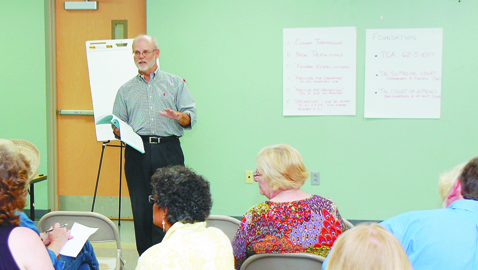
Metropolitan Planning Commission (MPC) director Mark Donaldson explains the zoning regulations of funeral homes offering cremations at the public meeting last Thursday.
By Sarah Baker
On Thursday, May 3, The Metropolitan Planning Commission held a public meeting in the community room at the Cansler Family YMCA to hear input regarding proposed zoning regulations for the placement of facilities for cremation in the City of Knoxville.
Last fall Gentry-Griffey Funeral Chapel in Fountain City received a permit from the State of Tennessee and was issued a building permit by the City of Knoxville to construct a facility for cremation as an accessory use. This was much to the chagrin of many Fountain City residents and led to a series of actions that have taken place since.
At its November 29, 2011 meeting City Council requested MPC study, analyze, and make recommendations to them regarding appropriate siting and permitting of crematoria within the city. In December, Fountain City residents appealed the decision of the city building officials to issue the building permit. In January, the Board of Zoning Appeals denied the appeal, MPC staff conducted a public meeting to solicit input of crematory placement and regulation, and the Fountain City Community Awareness Network appealed the decision of the City BZA to the Knoxville City Council.
In February, City Council denied the appeal and upheld the decision of the BZA that a facility for cremation is an accessory use to a funeral home and that the permit was properly issued. In March, MPC considered proposed amendments to the City of Knoxville zoning regulations and postponed its decision until its May 10th meeting, requesting that staff conduct an additional meeting and invite members of the funeral industry to participate.
About 20 people attended the May 3 meeting at the YMCA in East Knoxville. MPC director Mark Donaldson explained that the Tennessee State Supreme Court ruled in 1966 that the legal definition of a funeral home includes the use of a crematorium as part of the same industry. Because of this and other considerations including municipal regulations from Murfreesboro, Tenn., and Charlotte, N.C., MPC is recommending regulations that would distinguish between facilities used for cremation at a funeral home and crematoriums built for principal use. Those built for “accessory use” would require use on review and those built for principal use would be regulated to industrial districts.
Donaldson also explained that one aspect of the regulations on facilities used for cremation with a funeral home would be that cremations can only be done as a part of services offered by the same funeral home. Therefore, cremations should not exceed the number of funerals provided by the funeral home.
This regulation, however, probably will not affect Gentry-Griffey because they will be grandfathered in with their existing permits. Still, according to Eric Botts, director at Gentry-Griffey Funeral Chapel, they have performed twice as many funerals as cremations this year.
Many residents expressed disappointment and anger that nothing is being done to take back the permit already given to Gentry-Griffey. In fact, some have filed a lawsuit against the city for granting it in the first place. Nevertheless, local regulations cannot be created that are in conflict with state laws. “We’re not mad at MPC,” said Fountain City resident Jamie Rowe. “We’re not mad at the funeral home. We’re mad about the process. We care about what happens in other areas of Knoxville. We shouldn’t care after what was done to us, but we do.”
Rebecca Longmire and other members of the MPC tried to steer the conversation toward the future. “We can only look forward. We’re trying to provide you with a step to better the process,” said Longmire. At its May 10 meeting, the planning commission will consider zoning regulations drafted by MPC staff and conduct an additional public hearing and make a recommendation to City Council. If MPC takes action at its May meeting, its recommendation will be forwarded to City Council for consideration at its meetings June 12th and June 26th.







